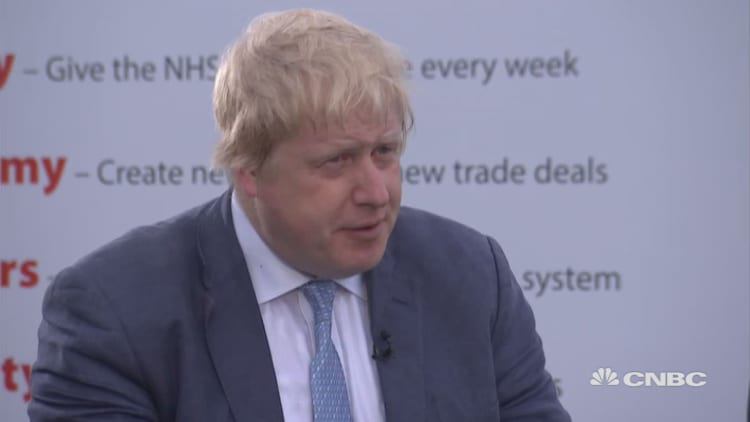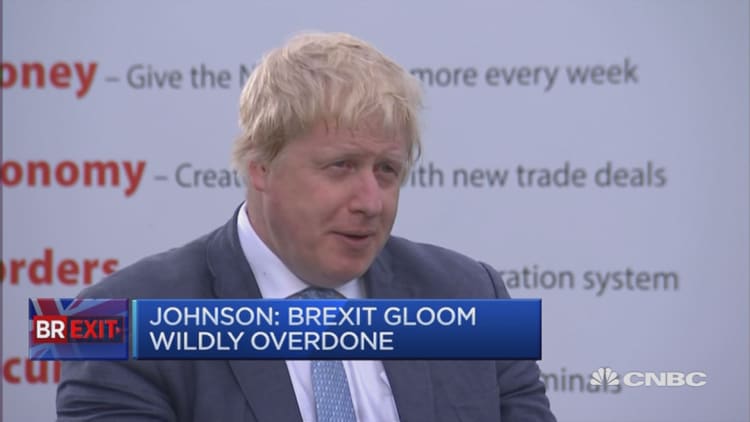

Boris Johnson, the former London mayor, denounced comments about Muslims made by Republican presidential candidate Donald Trump, while blasting the U.K.'s campaign to exit the European Union as a pivotal "once in a generation" decision.
Last year, the GOP frontrunner called for a temporary ban on Muslims entering the U.S.. Trump's comments, which followed the attacks in Paris and San Bernardino last year, were widely condemned.
"I thought that was an extraordinary thing for a candidate for the office of President of the United States to say," Johnson told CNBC in an interview on Saturday, "basically because America as I understand it is built on the ideal of welcoming people irrespective of their race, religion, color or creed."
Last month, Trump told The New York Times in an interview that there could be exceptions to such a ban. He was asked if Sadiq Khan, London's new mayor and a Muslim of Pakistani heritage, would be allowed to travel freely to the U.S.
Khan quickly responded, saying Trump and those around him "think that Western liberal values are incompatible with mainstream Islam."
In a statement emailed to CNBC, Khan said that "London has proved him wrong."
Johnson is a leading campaigner for Britain to leave the European Union, better known as the "Brexit" campaign. His position has put him in the crossfire of members of his own party who believe the U.K. should remain within the E.U.
On Sunday, former Tory prime prime minister John Major accused the Brexit camp of pushing "inaccurate and frankly untrue" information. He blasted Johnson as a "court jester" leading a campaign that was "verging on the squalid."
In April, U.S. President Barack Obama traveled to the U.K to issue a warning on "Brexit", arguing that "the European Union doesn't moderate British influence – it magnifies it."
However,Johnson insisted that Americans would not have tolerated the "loss of democratic control" that resulted from being in the EU.
"They (Americans) would never dream of subsuming,subordinating, subjugating their own democracy to the type of system that we have," he said. "In the end this is a decision for the British people."
The former London mayor denounced Europe's decision making as "profoundly sclerotic," and hit the continent for a system that perpetuates low growth.
"And that's partly, not just, because of the euro, but partly because of the massive legislation that comes from Brussels in a one size fits all way that is often for the benefit of big companies," he added.
'Once in a generation' vote
Johnson's "out" campaign has pitted him against fellow Conservative and U.K. Prime Minister David Cameron who is campaigning for the U.K. to remain a member of the 28-country bloc.
The referendum, set to be held on June 23, has put investors on edge, amid warnings that both the stock market and sterling could see sharp declines in the event of a vote in favor of leaving the union.
"I see no reason, the pound's value will be determined according to the strength of the U.K. economy," he said. "And I have every reason to think that the U.K. economy would prosper mightily outside the European Union which is currently democratically and economically, I believe, holding us back."
He said the referendum was a "once in a generation chance to take back control from an institution that is out of control, spending ever growing quantities of British taxpayers' money."
U.K. Chancellor George Osborne, who is campaigning alongside Cameron to remain in the EU, has warned of an economic shock and long-term economic costs if the U.K. voted to opt out.
Johnson, however, argued that nobody can possibly say what will what would happen as a result of a so-called Brexit.
"I think that over time the U.K. economy would get a lot of dynamism from the removal of so much of the regulation and the inappropriate law that holds us back." Johnson told CNBC.
"It's making it impossible for us to do all sorts of things that you'd expect a country to be able to do, like control our borders, control our tax rates, help our energy companies, all sorts of things."
Recent data showing migrants continue to flock to the U.K. from the Continent have added political fuel to the fire of the Brexit debate, with the "out" campaign arguing that cutting ties with Europe will help curb immigration.
Regarding taxation, EU member states have the power to set their own tax policy, but there are standard EU rules on VAT, the value-added tax on goods and services which is set at no less than 15 percent. There is no maximum and EU member states can opt to apply reduced rates to certain goods and services.
Johnson said it was hard to predict the level of potential uncertainty following a "Brexit," but added "the prognostications of gloom that you're hearing now are wildly overdone."
"I think there would be a massive opportunity for U.K. business," he said.
He did not think the current government would need to step down in the event of a decision to leave, but "on day one...what they would then be able to do is set in train a process by which they could take back control of our immigration system, and institute a British version of the Australian point system for immigration - number one."
He added they could also "take back control" of the judiciary.
"The European Court of Justice would no longer be supreme," Johnson said. "You could very rapidly decide that the ECJ—European Court of Justice in Luxembourg—was no longer able to intervene and and to tell us who could be on the streets of London and we'd be able to deport terrorists—those whose presence is not conducive to the public good."
--Reuters contributed to this article.



